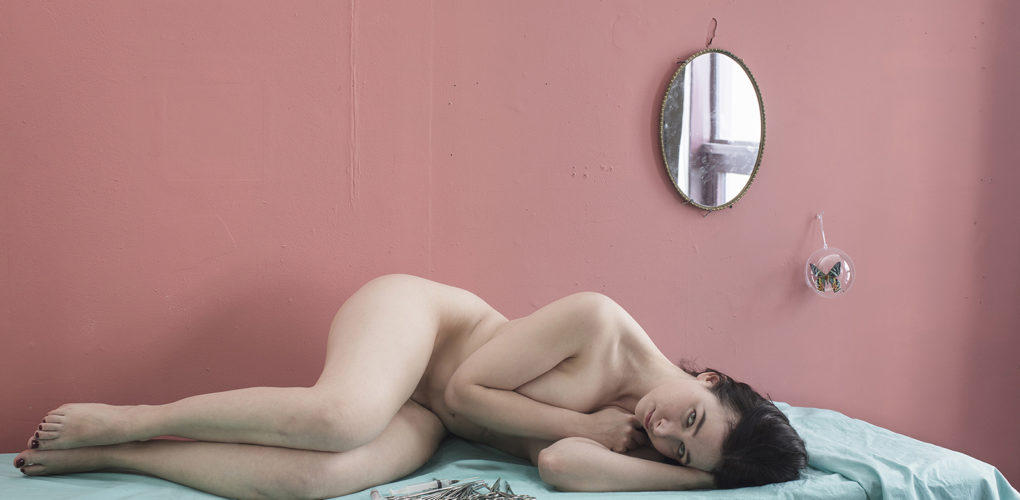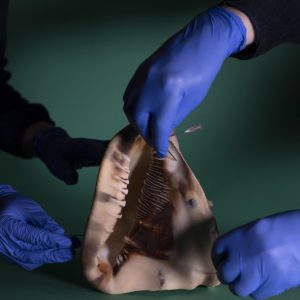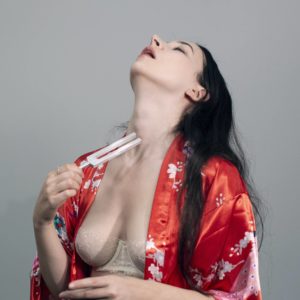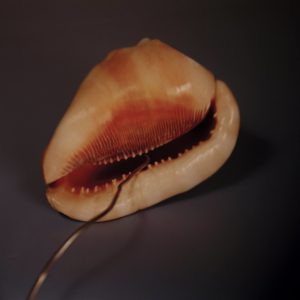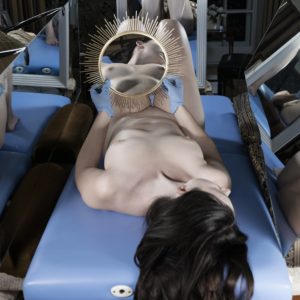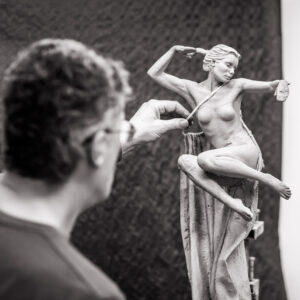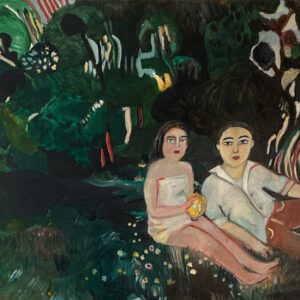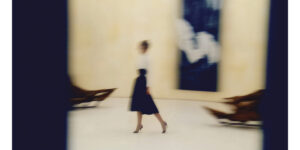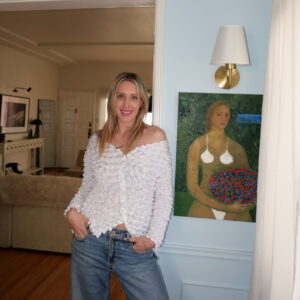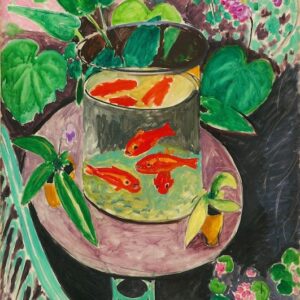The Others
 Meet The Others: Izabela Jurcewicz
Meet The Others: Izabela Jurcewicz
In a time of widespread suffering, we talked to The Other Art Fair Artist, Izabela Jurcewicz, whose work addresses human fragility to discuss pain and processing through art.
Izabela Jurcewicz uses her camera to capture and control her trauma. The action both documents the pain but more importantly she found it facilitated healing. At nineteen, Izabela was admitted to hospital with extensive internal bleeding. They discovered a rare tumor, one of 300 cases worldwide. After spending weeks in hospital to stabilize her condition she went into surgery. The physical and emotional scars of being cut open and operated on have informed her practice as a photographer. With both strength and sensitivity visible in her work.
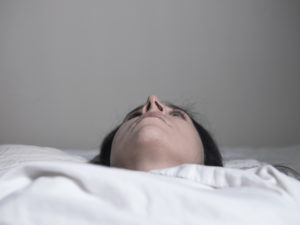
Lying Still (After My Father)
Izabela’s work is particularly poignant considering the health concerns confronting humans everywhere. The world is overwhelmed by traumatic images. Images that 6 months ago could only be imagined. The photographers taking these images are putting themselves at risk to tell the stories that statistics can’t while articulating emotions that can’t be put into words. Unable to leave our homes photographs are our link to the outside world and enable a better understanding of the hardships being faced.
Photography like most things will look different in the wake of the crisis. What will social distancing mean to the intimacy of photography, if photographers can no longer get close to their subjects? Will photographers be forced to turn to themselves as subject resulting in a rise of self portraiture? We don’t know what the world or photography will look like in 6 months but we can only hope it comes out as sensitive and strong as Izabela’s work. With those questions and concerns in mind we asked Izabela some questions about her series Body as a Negative. Sensations of Return:
Can you talk a bit about the resilience and strength of the human body?
From my perspective, the human body is fragile and vulnerable. But I think that people only become aware of it once they are faced with an illness. Suddenly they become aware of the physicality of their being. They finally become aware of the existence of the organ they have problems with, as it starts to radiate and hurt. It’s a battle to get back to health again, and it takes a lot of inner strength and hope not to let go of yourself at those times. But yes, At the same time, the human body has this ability for renewal and resilience, which is wonderful. It’s a mystery of what actually happens sometimes and why one person gets cured while another doesn’t.
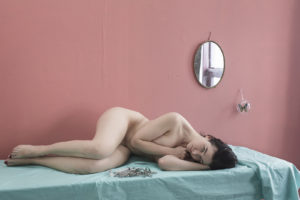
Pink Room
How did art help you heal?
Photography took a crucial role in dealing with memories and internal tension. I was an inter-organ tumor patient, an exceptionally rare condition, where science had few answers to the cause and how to proceed – which resulted in my relationship with technology.
This experience of a patient being ‘on view,’ researched and scanned, coined my relationship with the camera and ways of seeing a human body. Medical experiences, especially surgeries, live as a photographic negative in my life, which produce images.
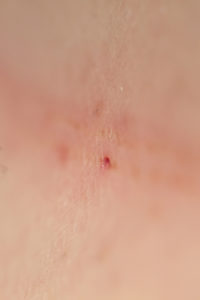
Examination
Medical experiences, especially surgeries, live as a photographic negative in my life, which produce images.
Working on Body as a Negative. Sensations of Return was a reflective process of relating to myself and my body’s intelligence. Serious about understanding my body, I turned a lens of attention on it. Photography allowed me to re-attune myself with my body. I replaced the invasive surgical instrument with my camera as a receptive device to register, merge and enable a ritual of healing. As an extension of the healing treatments, my photographic process allowed me to settle into my body even more. So much was surfacing as I took control. This body as a negative was not static; rather it was a repository of emotion and of ease and freedom.That’s how this body of work about my body and my experience began.
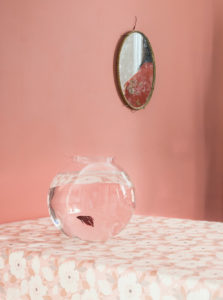
Echo
The camera records and offers a reflective process, acting as a silent observer. I am able to become both the surgeon, positioning the camera from an analytical perspective to look at myself, and the patient, reflecting upon the feelings in my body.
It was also a way to relate to my family, an expression of empathy between daughter and father. My medical experiences, especially surgeries, operated as painful events and memories and were brought up again by the news that my father was diagnosed with fourth-staged metastatic cancer.
There is an empathy and tenderness in your work, are these emotions crucial to you and your practice?
Empathy is a crucial emotion to me, and triggering empathy is definitely one of the main motivations in my work. It is this process of emphatic engagement that brings dimensionality to the body and self again, and grows a capacity to join with the suffering of others. I believe the tenderness visible in my work is a result of an empathetic approach.
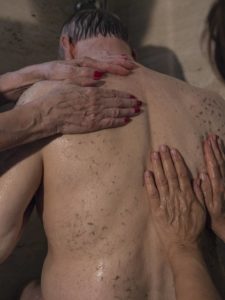
Healing Bath
After “Body as a Negative. Sensations of Return” I supported my Father, through his own cycle of trauma, as a cancer patient from 2016 – 2019. To understand better what he was going through, I observed him. I studied him and tried not to lose our connection. I didn’t want to become an outsider to his illness. I physically started placing myself in his spaces and positions. I photographed myself as if I were him. This allowed me to more fully process what was happening to him and to better communicate with and support him. For example in Sitting Up (After My Father)I was in his medical bed, trying to sit up while looking at medical stockings he had to wear to counter the side effects of chemotherapy. Though I empathized with him previously, this experience performed for the camera of half-lying-half-sitting, forced me to honestly confront his physical limits.
Where are you at the moment and are you still able to make work? If so, what are you working on?
I am currently in Warsaw, Poland, where I’m originally from. I work as a lecturer at the Photography Department at the University of Arts in Poznan, and for the last few weeks we have been teaching classes online like Universities all over the world. After my surgery all those years ago, I am an immune compromised person, at high risk with COVID-19 and should avoid leaving my home. I take this seriously, as I get infections easily and it takes me a long time to heal. Consequently I am limited to working only in my domestic space. I do what I can and am working on a project that deals with the loss of a close one. Photography comes as a companion to deal with emotions.
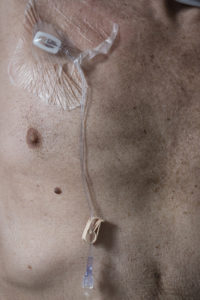
Chemo
Izabela’s work is featured in The Online Studios brought to you by The Other Art Fair. A new online platform offering art lovers around the world access to over 800 Fair artists, The Online Studios will keep our community feeling inspired, engaged, and continue to spread joy through art.
